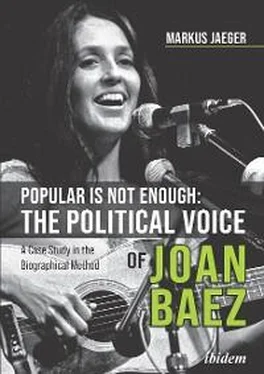This considerable chronology starts with chapter four about the 1950s, when Baez, still a teenager, committed the first public act of disobedience and took her first steps as a local folk musician in the Coffee House scene in Boston during the end of the decade. It offers a short synopsis of culture and politics of the United States during the 1950s and describes the radical Cold War paranoia which was the background of Baez’s tender beginnings as an activist. It refreshes basic information about the Folk Music Revival during the end of the decade, which turned into the most relevant musical root for Joan Baez as a singer.
Chapter five about the most triumphant decade in the career of Baez starts with a summarizing outline of the most significant developments within American culture and politics during the 1960s, when more than ever since World War II, current moral, social, ethnical and political demarcations in a fragmented society were experienced with growing doubts by a majority of American citizens. The second sub-chapter continues the observation of Baez’s friendship with Dr. Martin Luther King, Jr., and explains the contribution of her fame as a singer of national and international renown to the success of numerous demonstrations on behalf of the Civil Rights Movement—the famous March on Washington in August 1963 being just one example. Afterwards, a discussion of Baez’s commitment to the so-called Free Speech Movement highlights the fact that this movement started with just a few courageous students and teachers on American campuses and soon turned out to become the basis for the later massive anti-Vietnam War Movement. Baez also became a sincere spokeswoman for the anti-war protest activities, which were aimed to loudly articulate dissent against the American intervention in South East Asia and turned into a significant factor for ending the increasingly unpopular war in Vietnam.
Chapter six about the 1970s suggests a sharp cultural—and later also political—comeback of conservatism in the United States, particularly during the years after the military defeat in Vietnam. In such a tightening climate, no one wanted to talk about war or anti-war activities anymore and a politically active singer like Joan Baez increasingly had to face difficulties in getting the attention of the same audiences as during the successful first decade of her career. Nonetheless, Baez continued working with her very own combination of being a popular singer and a political activist at the same time. The next three sub-chapters explain how she adapted her activities to other political realities and started to focus on political developments in numerous countries abroad. A human rights organization like Amnesty International profited immensely from Baez and her fame during the 1970s, when she—as only one example—supported the process of freeing political prisoners in Latin America. Baez articulated another significant dimension of her social conscience when she publicly supported the first activities of the Gay Liberation Movement—outing herself as having had bisexual experiences and releasing several self-penned songs which explicitly dealt with the topic of homosexuality long before it became en vogue to be out and proud about it. The end of the decade found Baez returning to the topic of Vietnam, when she ignored the national suppression of the traumatic experiences in Vietnam and—against all odds—publicly protested against organized violence in South East Asia only four years after the end of the Vietnam War.
Chapter seven outlines Joan Baez’s most important musical as well as political endeavors during the apolitical times of the 1980s. Her musical career started to tumble over the prevailing ethos of the decade that commercial success was the one and only thing that counted for an artist. A politically active singer, who was increasingly seen as a remnant of times long gone by, had to face difficulties to keep up with a career in a climate which primarily propagated national economic and political narcissism. The first argumentative step of this chapter is again a synopsis about the then current cultural and political state of affairs in the Unites States, which offered nothing but this kind of collective bow in front of nothing else than profit. Baez, however, did not give in to these professional difficulties and continued with what she had done before. The second sub-chapter explains the overtly political background of her musical tour in Latin America in 1981. A few years later, Baez visited Poland—once more as a singer with much more to offer than the 1980s’ ethos of the big commercial hit. The third sub-chapter has a closer look at this 1985 trip by Baez to Poland and her meeting with the leader of the politically very successful workers’ movement Solidarnosc and later President of the country, Lech Walesa. The last incisive effort of Baez during this rather difficult decade of her career was a highly political performance in Czechoslovakia in 1989, several months before the Velvet Revolution, a successful non-violent political development, which President Vaclav Havel later explicitly connected to the Joan Baez concert earlier that year. This undertaking concludes the analysis of Baez’s artistic and political activities during the 1980s and most outstandingly marks the reason why the combination of popular music and political activism includes much more than Adorno’s pessimism.
The following eighth chapter analyses artistic and political challenges for Baez during the 1990s, when she had to face the necessity to re-arrange her professional priorities. Several younger producers and new and fresh songwriting talents supported her successful attempts to hold on to a musical career, including the release of studio and live-music albums and a Grammy nomination as well as numerous promotion tours through the United States and Europe and many other regions around the globe. The general growing political dissatisfaction in the United States, as outlined in the first sub-chapter, among other dimensions, was driven by a generation conflict which labeled young people with the not very flattering X—standing for a lack of orientation. Such youth and their changing musical taste created an artistic surrounding in which it was a mentionable success for an artist like Baez (whose music often was wrongfully labeled as still purely folk) to professionally survive. The political dimension of her work forced Baez to more selective engagements, but she did not stop lending her voice to political issues. The second sub-chapter exemplifies this professional integrity in her earlier activities with an analysis of her trip to Bosnia in the middle of the Balkan War. It accentuates her experiences as well as her passionate attempts to draw international attention to the horrors of the war in former Yugoslavia.
The ninth chapter welcomes Baez in the New Millennium. It triggers off the analysis of her activities in the first decade of the 21st century with another summation about the most important driving forces within the culture and politics in the United States and examines the question in what ways these developments are relevant for Baez’s professional life. Secondly, a discussion about her return to the anti-war movement explains in what ways the massive international protest activities against the war in Iraq differ from the organized protest movement against the Vietnam War during the 1960s and the 1970s. It gives, however, reasons why those two different historic dimensions are still comparable. The last sub-chapter observes the necessity to point out that democracy and censorship do not fit together and discusses Baez’s experiences in this regard in 2007.
The tenth chapter finishes the analyses of Baez’s political significance and non-violent authenticity with a closer look at her activities in the 2010s. It summarizes her most relevant accolades during the final decade of her career during one of the most troubled political phases in the United States. Her song “Nasty Man” on the 45th President of her home country eloquently sums up the reason why her work is the lifelong prove for the fact that being popular is not enough.
Читать дальше












